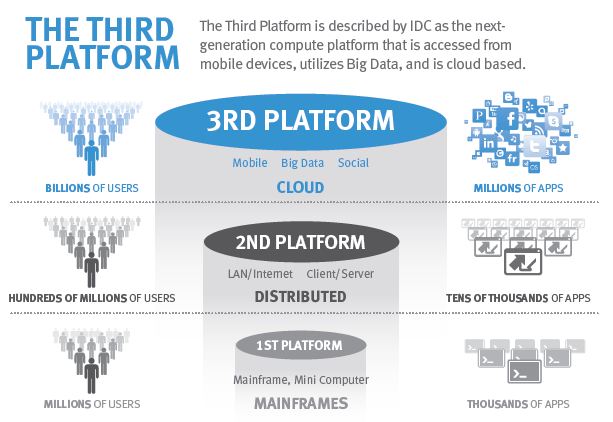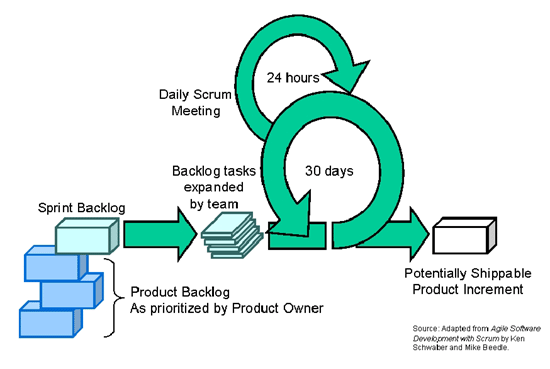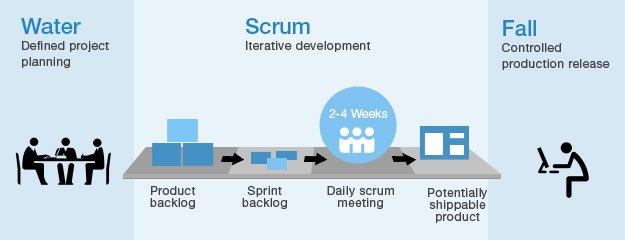DevOps Is The New Agile
In The Structure of Scientific Revolutions, Thomas Kuhn argues that science is not a steady accumulation of facts and theories, but rather an sequence of stable periods, interrupted by revolutions.
 During such revolutions, the dominant paradigm breaks down under the accumulated weight of anomalies it can’t explain until a new paradigm emerges that can.
During such revolutions, the dominant paradigm breaks down under the accumulated weight of anomalies it can’t explain until a new paradigm emerges that can.
We’ve seen similar paradigm shifts in the field of information technology. For hardware, we’re now at the Third Platform.
For software, we’ve had several generations of programming languages and we’ve seen different programming paradigms, with reactive programming gaining popularity lately.
The Rise of Agile
We’ve seen a revolution in software development methodology as well, where the old Waterfall paradigm was replaced by Agile. The anomalies in this case were summarized as the software crisis, as documented by the Chaos Report.
The Agile Manifesto was clearly a revolutionary pamphlet:
We are uncovering better ways of developing software by doing it and helping others do it.
It was written in 2001 and originally signed by 17 people. It’s interesting to see what software development methods they were involved with:
- Adaptive Software Development: Jim Highsmith
- Crystal: Alistair Cockburn
- Dynamic Systems Development Method: Arie van Bennekum
- eXtreme Programming: Kent Beck, Ward Cunningham, Martin Fowler, James Grenning, Ron Jeffries, Robert Martin
- Feature-Driven Development: Jon Kern
- Object-Oriented Analysis: Stephen Mellor
- Scrum: Mike Beedle, Ken Schwaber, Jeff Sutherland
- Andrew Hunt, Brian Marick, and Dave Thomas were not associated with a specific method
Only two of the seven methods were represented by more than one person: eXtreme Programming (XP) and Scrum. Coincidentally, these are the only ones we still hear about today.
Agile Becomes Synonymous with Scrum
 Scrum is the clear winner in terms of market share, to the point where many people don’t know the difference between Agile and Scrum.
Scrum is the clear winner in terms of market share, to the point where many people don’t know the difference between Agile and Scrum.
I think there are at least two reasons for that: naming and ease of adoption.
Decision makers in environments where nobody ever gets fired for buying IBM are usually not looking for something that is “extreme”. And “programming” is for, well, other people. On the other hand, Scrum is a term borrowed from sports, and we all know how executives love using sport metaphors.
[BTW, the term “extreme” in XP comes from the idea of turning the dials of some useful practices up to 10. For example, if code reviews are good, let’s do it all the time (pair programming). But Continuous Integration is not nearly as extreme as Continuous Delivery and iterations (time-boxed pushes) are mild compared to pull systems like Kanban. XP isn’t so extreme after all.]
Scrum is easy to get started with: you can certifiably master it in two days. Part of this is that Scrum has fewer mandated practices than XP.
That’s also a danger: Scrum doesn’t prescribe any technical practices, even though technical practices are important. The technical practices support the management practices and are the foundation for a culture of technical excellence.
The software craftsmanship movement can be seen as a reaction to the lack of attention for the technical side. For me, paying attention to obviously important technical practices is simply being a good software professional.
The (Water)Fall Of Scrum
The jury is still out on whether management-only Scrum is going to win completely, or whether the software craftsmanship movement can bring technical excellence back into the picture. This may be more important than it seems at first.
 Since Scrum focuses only on management issues, developers may largely keep doing what they were doing in their Waterfall days. This ScrumFall seems to have become the norm in enterprises.
Since Scrum focuses only on management issues, developers may largely keep doing what they were doing in their Waterfall days. This ScrumFall seems to have become the norm in enterprises.
No wonder that many Scrum projects don’t produce the expected benefits. The late majority and laggards may take that opportunity to completely revert back to the old ways and the Agile Revolution may fail.
In fact, several people have already proclaimed that Agile is dead and are talking about a post-Agile world.
Some think that software craftsmanship should be the new paradigm, but I’m not buying that.
Software craftsmanship is all about the code and too many people simply don’t care enough about code. Beautiful code that never gets deployed, for example, is worthless.
Beyond Agile with DevOps
Speaking of deploying software, the DevOps movement may be a more likely candidate to take over the baton from Agile. It’s based on Lean principles, just like Agile was. Actually, DevOps is a continuation of Agile outside the development team. I’ve even seen the term agile DevOps.
So what makes me think DevOps won’t share the same fate as Agile?
First, DevOps looks at the whole software delivery value stream, whereas Agile confined itself to software development. This means DevOps can’t remain in the developer’s corner; for DevOps to work, it has to have support from way higher up the corporate food chain. And executive support is a prerequisite for real, lasting change.
Second, the DevOps movement from the beginning has placed a great deal of emphasis on culture, which is where I think Agile failed most. We’ll have to see whether DevOps can really do better, but at least the topic is on the agenda.
 Third, DevOps puts a lot of emphasis on metrics, which makes it easier to track its success and helps to break down silos.
Third, DevOps puts a lot of emphasis on metrics, which makes it easier to track its success and helps to break down silos.
Fourth, the Third Platform virtually requires DevOps, because Systems of Engagement call for much more rapid software delivery than Systems of Record.
Fifth, with the number of security breaches spiraling out of control, the ability to quickly deploy fixes becomes the number one security measure. The combination of DevOps and Security is referred to as Rugged DevOps or DevOpsSec.
What do you think? Will DevOps succeed where Agile failed? Please leave a comment.
| Reference: | DevOps Is The New Agile from our JCG partner Remon Sinnema at the Secure Software Development blog. |










Thanks for sharing
Scrum Certification training is focused on Scrum basics and the Scrum Master, Product Owner and Team role.
Thanks for this awesome post